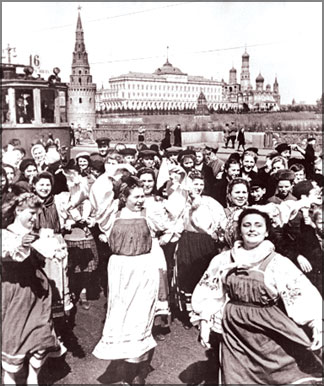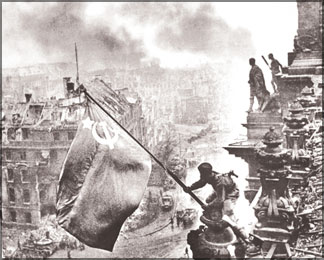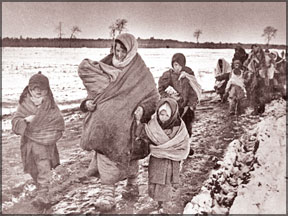Struggle that led to a new world pattern
On the 65th anniversary of the Great Victory over
Nazism:
As the 65th anniversary of the Great Victory
over Nazism is celebrated the world over this month, May 9 has special
significance in the Russian calendar of memorable dates.
Victory Day touches the hearts of every Russian, not only because of
Russia’s contribution to the Great Victory by defeating the greatest
number of the Nazi forces, but also because there is hardly a family in
Russia which had not lost at least one member in that war. The ordeals
faced by the peoples of the Soviet Union in this war, reveal the
greatness of the human spirit, manifested in numerous examples of
heroism, personal valour and patriotism. That is why it is recorded as
the Great Patriotic War that all Russians remember.
|

Victory Day (May 9 1945) |
While many veterans of the Great Patriotic War are daily leaving us,
the memory of those who perished in many ways defending the Fatherland
from the Nazi plague of the 20th Century, remains.
There are also lessons for the world community from this Great
Victory not lost even today. It is no coincidence that ahead of the 65th
anniversary of this Victory, a keen debate on it has begun in many
countries.
This is not confined to the interpretation of events of the war, but
new moral assessments of its outcome having a direct relationship to the
present-day European and world politics; for history is politics looking
into the past.
That is why, in discussing this theme, we bear moral responsibility
both to those who paid with their lives to defeat Nazism, and to the new
generations learning about the war from textbooks, films and historical
records. It is our responsibility to uphold the historical truth about
the war, and learn its lessons from the vantage point of contemporary
world development.
World War II was indeed an epochal event. It was a global battle that
in scale exceeded all previous armed conflicts. Amidst the collision of
different interests of states and ideologies, with diametrically
opposed, irreconcilable approaches to the very basis of mankind’s
existence, for the first time in history, there was the coming together
of divergent forces in this struggle for the preservation of life. The
gas chambers and crematoria of Oswiecim, Buchenwald, Salaspils and other
death camps have demonstrated both the meaning of fascism and what its
so-called “new order” had in store for the world.
Those in some countries who today question both the significance of
the Great Victory and the Soviet Union’s role in it, forget that without
it these countries might not have remained on the map.
The attempts to distort the history of the Great War lie in a bid to
assign the winners’ laurels to Western democracies and belittle the role
of the Soviet Union, at the same time blaming Hitler for unleashing the
Second World War.
In the history of the pre-war period, one must not forget the policy
of appeasement of fascist Germany pursued by Britain and US, aimed at
warding off aggression, and directing it to the East, against the USSR.
The shameful pinnacle of this policy was the Munich Agreement of 1938.
|

Banner of victory over the Reichstag in Berlin (Berlin May
1945) |
Today’s assertions about an “exaggeration of the Soviet contribution
to the cause of Victory” do not stand up to criticism. In 1944, the
length of the Soviet-German front was four times greater than all fronts
where the USSR’s allies fought. At the same period, up to 201 enemy
divisions fought on the eastern front, whereas only two to 21 divisions
faced the American-British troops. Even after the second front was
opened by the West, the allies had 1.5 million men in Western Europe,
while the Germans had 560,000. That was when 4.5 million German troops
were amassed on the Soviet-German front, against which 6.5 million
Soviet soldiers fought. The Hitlerite forces sustained major losses in
the battles against the Red Army - 70 percent of their manpower and 75
percent of all their military equipment - tanks, guns and aircraft.
Winston Churchill wrote, “It was the Russian Army who tore the guts
out of the German war machine.” George Bush echoed him at the
celebration of the 60th anniversary of the allies’ landing on Normandy,
“If not for Russia, none of this would have happened.”
We did not divide the victory into percentages in 1945, nor do we
divide it now. Together with our allies we marked the 65th anniversary
of the opening of the second front; together we shall celebrate the
Jubilee of Victory in Moscow. It was the common victory of the
anti-Hitler coalition. Yet, no one has the right to detract from the
price which the Soviet Union and its people paid in the course of the
war or play down the enormity of Nazi crimes.
The main outcome of the war, apart from being the victory of one
coalition against another, was in essence, the victory of the forces of
construction, progress and civilization over the forces of destruction
and barbarity; of life over death. The war became the greatest tragedy
for the peoples of Europe and the world. Regardless of whose side their
States fought, no one was untouched by its consequences. It is the duty
of historians to tell the truth about this tragedy, not as political
speculation, but assessing its outcome, without a shift in moral
guidelines. Speaking at Oswiecim on 27 January, 2005, then President
Vladimir Putin described the attempts to rewrite the history of the war
to equate the rights of the victims and hangmen, and liberators and
occupiers, as deeply immoral.
|

Each citizen was part of the Victory |
The creation of the anti-Hitler coalition can rightfully be called
the biggest diplomatic breakthrough of its time; an example of the
rallying of states of different ideologies and political systems in the
face of a common danger. Today, 65 years on, there is no need to
simplify or embellish history. Each State of the anti-Hitler coalition
pursued its aims, its national interests. Mutual trust did not come
easy. Still, the coalition succeeded in rising above differences to
achieve a common victory. The opponents of fascism were united by a
common understanding that evil had to be resisted together, sparing no
effort, allowing no compromises, no concessions or separate deals. This
lesson retains its relevance in full measure even today.
The experience of international brotherhood in arms during wartime
assumes particular significance when a global challenge is prevalent -
this time from international terrorism, no less dangerous or cunning
than fascism; no less merciless. Thousands of innocent civilians have
already become its victims. The foundations of civilization are once
again in jeopardy. Like fascism, terrorism has nothing but violence to
offer the world. It is prepared to trample upon the most elementary
norms of morality to achieve its maniacal aims.
Coping with this kind of threat, just as 65 years ago, is only
possible on the basis of solidarity and mutual trust. “Double standards”
with regard to terrorists are as inadmissible as attempts to
rehabilitate the fascists’ accomplices. Giving terrorists a public
platform to state their man-hating views is as immoral and unnatural for
contemporary Europe as the parades of former SS men in the countries
claiming adherence to democratic values.
Our duty by those who paid with their blood to save humanity from
fascism consists primarily of putting a reliable barrier in the way of
disseminating the ideas of intolerance and racial, national or religious
superiority; behind which pretensions of world dominance hide, serving
as a ground for new threats. The unity of the anti-terrorist coalition
of nations; harmonious development of relations between various
nationalities, with tolerance and mutual respect of cultural diversity,
with an open, constructive dialogue of civilizations - are the main
conditions for victory over the forces of hatred and extremism.
The lessons of World War II are also relevant from the viewpoint of
construction of the post-war world pattern. The outcome of the war
exerted a profound influence on the development of international
relations. Even now, 65 years later, when the world has changed beyond
recognition, the elements of the post-war arrangement of Europe and the
world retain an enormous significance for the cause of safeguarding
peace and security on our planet.
The urge to deliver humanity from the scourge of war inspired the
anti-Hitler coalition to establish a global mechanism to safeguard peace
and security - the United Nations Organization. Its Charter became the
basis of contemporary international law, and a fundamental code of
conduct for states and international organizations. The principles and
standards of the UN Charter, which stood the test of the Cold War, are
today an unquestioned basis for shaping a new, secure and equitable
world pattern in the era of globalization.
Courtesy: Russia Republic Embassy, Colombo |



